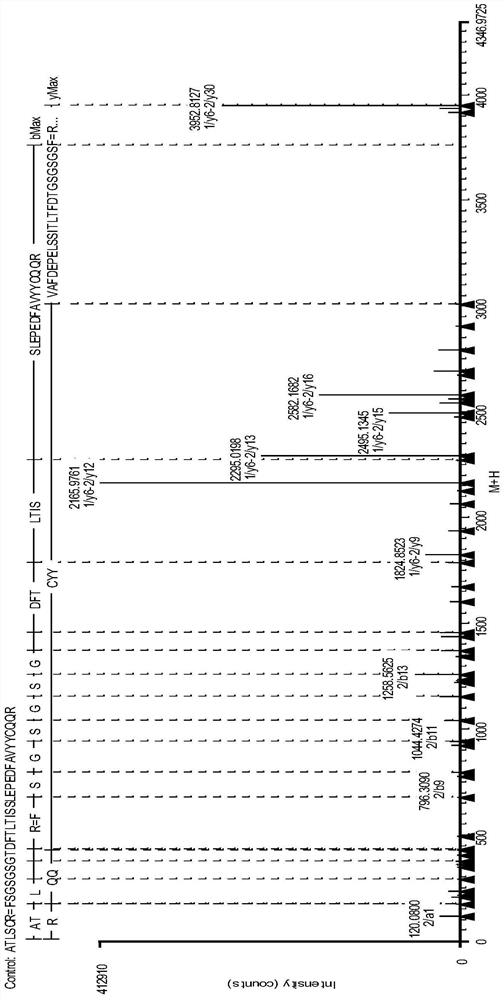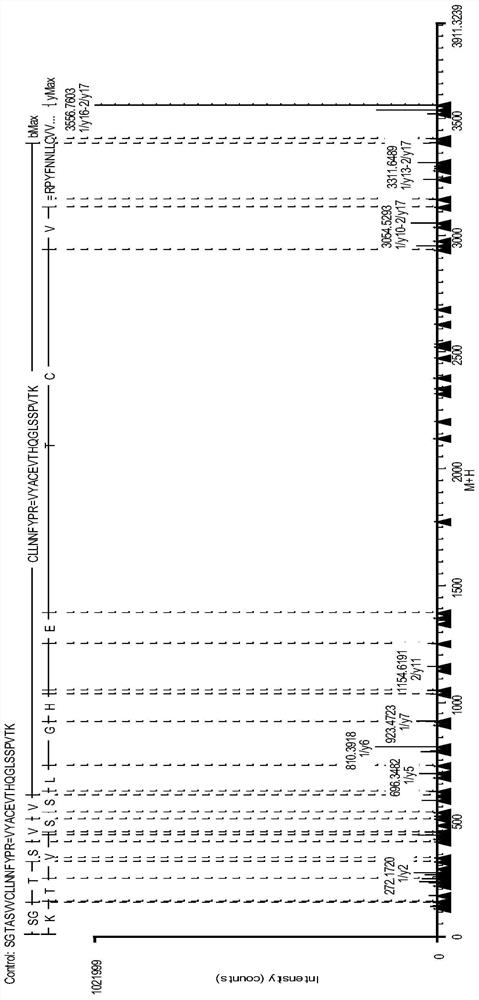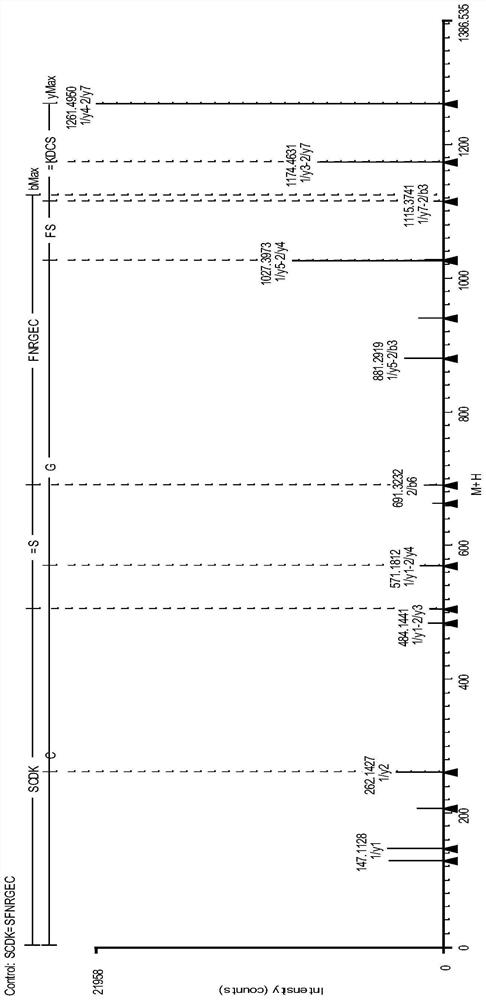Monoclonal Antibody Disulfide Bond Pairing Analysis Method
An analysis method and technology of disulfide bonds, applied in the field of antibody disulfide bond pairing analysis, can solve problems such as inconvenience, and achieve the effect of fewer enzyme digestion methods and abundant fragment ions
- Summary
- Abstract
- Description
- Claims
- Application Information
AI Technical Summary
Problems solved by technology
Method used
Image
Examples
Embodiment 1
[0045] Example 1: Antibody disulfide bond pairing analysis (trypsin combined with Lys-C digestion)
[0046] Monoclonal antibody disulfide bond pairing analysis steps:
[0047] (1) Protein denaturation treatment
[0048] Take 0.5 mg of the protein sample and add it to 380 μl of denaturation buffer (8M guanidine hydrochloride+5mM EDTA+0.5M Tris, pH8.3), mix well, and incubate at 37°C for 60 minutes. Ultrafiltration centrifugation or desalting column desalting to 50mM NH 4 HCO 3 (pH8.0) buffer.
[0049] (2) Enzymolysis
[0050] Take 100 μg of the protein in (1), add trypsin at 1:25 (wt / wt), add Lys-C at 1:200, combine with enzymatic hydrolysis monoclonal antibody, and incubate at 37°C for 4 hours.
[0051] (3) Reduction and termination of enzymatic hydrolysis
[0052] After the enzymatic hydrolysis of the sample in (2) is completed, take half of the sample and add formic acid FA to a final volume concentration of 0.1%; add 1 μL of 0.1M DTT to the other half of the sample vo...
Embodiment 2
[0068] Example 2: Monoclonal Antibody Disulfide Bond Pairing Analysis (Trypsin Digestion)
[0069] Monoclonal antibody disulfide bond pairing analysis steps:
[0070] (1) Protein denaturation treatment
[0071] Take 0.5 mg of the protein sample and add it to 380 μl of denaturation buffer (8M guanidine hydrochloride+5mM EDTA+0.5M Tris, pH8.3), mix well, and incubate at 37°C for 60 minutes. Ultrafiltration centrifugation or desalting column desalting to 50mM NH 4 HCO 3 (pH8.0) buffer.
[0072] (2) Enzymolysis
[0073] Take 100 μg of the protein in (2), add trypsin-digested monoclonal antibody at 1:25 (wt / wt), and incubate at 37°C for 4 hours.
[0074] (3) Reduction and termination of enzymatic hydrolysis
[0075] After the enzymatic hydrolysis of the sample in (2) is completed, take half of the sample and add formic acid FA to a final volume concentration of 0.1%; add 1 μL of 0.1M DTT to the other half of the sample, and add formic acid FA to a final volume concentration o...
Embodiment 3
[0080] Example 3: Monoclonal Antibody Disulfide Bond Pairing Analysis (Lys-C Digestion)
[0081] Monoclonal antibody disulfide bond pairing analysis steps:
[0082] (1) Protein denaturation treatment
[0083] Take 0.5 mg of the protein sample and add it to 380 μl of denaturation buffer (8M guanidine hydrochloride+5mM EDTA+0.5M Tris, pH8.3), mix well, and incubate at 37°C for 60 minutes. Ultrafiltration centrifugation or desalting column desalting to 50mM NH 4 HCO 3 (pH8.0) buffer.
[0084] (2) Enzymolysis
[0085] Take 100 μg of the protein in (1), add Lys-C enzymatic monoclonal antibody at 1:200 (wt / wt), and incubate at 37°C for 4 hours.
[0086] (3) Reduction and termination of enzymatic hydrolysis
[0087] After the enzymatic hydrolysis of the sample in (2) is completed, take half of the sample and add formic acid FA to a final volume concentration of 0.1%; add 1 μL of 0.1M DTT to the other half of the sample, and add formic acid FA to a final volume concentration of ...
PUM
 Login to View More
Login to View More Abstract
Description
Claims
Application Information
 Login to View More
Login to View More - R&D
- Intellectual Property
- Life Sciences
- Materials
- Tech Scout
- Unparalleled Data Quality
- Higher Quality Content
- 60% Fewer Hallucinations
Browse by: Latest US Patents, China's latest patents, Technical Efficacy Thesaurus, Application Domain, Technology Topic, Popular Technical Reports.
© 2025 PatSnap. All rights reserved.Legal|Privacy policy|Modern Slavery Act Transparency Statement|Sitemap|About US| Contact US: help@patsnap.com



